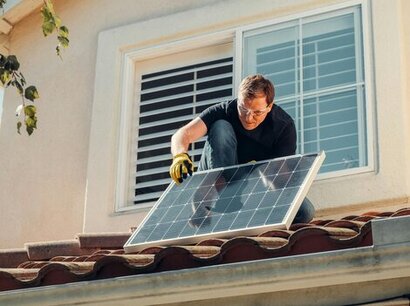
The new research reveals that more than a third of Brits are heavily influenced by their neighbours when it comes to being more green, and nearly 40 percent would consider home improvements if a neighbour were to have work done or installed. In addition, more than a quarter say they live in or would choose to live in an area where the community is more eco-conscious, with renewable energy sources like solar panels in use. And those considering renewable energy sources say they would feel proud about doing something good for the planet.
Actions speak louder than words, though as 28 percent of Brits revealed they do not speak to their neighbours at all. However, of those who do, almost 10 percent discuss the environment more than they did five years ago, and one in five say they would seek out advice from their neighbours on renewable energy sources for their home. Perhaps unsurprisingly, the cost-of-living is the biggest rising issue discussed, with more than 40 percent of Brits chatting about the topic over the garden fence.
“Our new research shows the power of social influence and community dynamics in fostering sustainable behaviours” said Adam Parvez, Behavioural Science Specialist at iChoosr, which delivers the Solar Together group buying schemes. “Individuals look to their peers for cues on how to act, especially in areas where they may feel uncertain or seek validation. The findings build on previous research that found one of the biggest predictors of getting solar panels was if your neighbour also had them – and, in particular, if existing installations are highly visible. Understanding and harnessing these behavioural drivers will not only drive adoption of renewable energy - facilitating a shift towards more sustainable living - but also build stronger, more environmentally conscious communities in the process.”
Despite 44 percent agreeing they like the idea of being more self-sufficient, the study reveals homeowners are being held back from adding renewable energy sources to their homes due to the perceived complexity and a lack of understanding around the financial implications. Furthermore, with a General Election looming, there is a clear lack of understanding about the Government’s positions and policies relating to environmental issues. In fact, a third admitted to not even knowing who the UK Energy Secretary is and some admit they have no understanding of the Government’s environmental policies.
“The rising cost-of-living and shakeup in the energy market over the past couple of years have shifted perceptions and attitudes – and as a result rising numbers of homeowners are looking for renewable energy sources to cut costs and be more eco-conscious” added George Frost, UK Country Manager at iChoosr, which delivers the Solar Together group buying schemes. “And, as we can see, more of us are now leaning over the garden fence to ask for neighbourly advice on how to make the switch.”
The survey also found nearly a quarter (25 percent) of respondents are more likely to take up exercise if they see their neighbours doing so, but only 15 percent would be influenced by a neighbour to buy a pet, and only 7 percent to buy a new car. The least influential actions include having cosmetic enhancements or surgery and starting or growing a family, at 1 percent and 5 percent, respectively.
iChoosr partners with councils to deliver the highly successful Solar Together programme across the UK. Solar Together has delivered more than 30,000 solar panel installations, which are expected to remove 630,000 tonnes of carbon emissions over the next 25 years.
For additional information:

